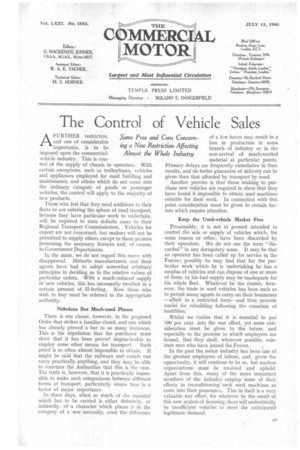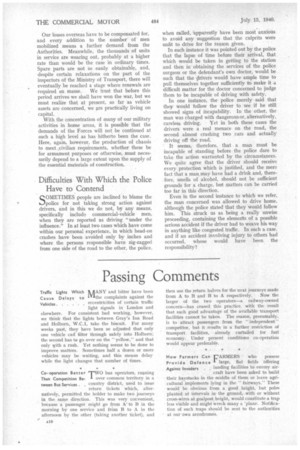The Control of Vehicle Sales
Page 11

Page 12

If you've noticed an error in this article please click here to report it so we can fix it.
AFURTHER restriction, and one of considerable importance, is to be imposed upon the commercialvehicle industry. This is control of the supply of chassis to operators. With certain exceptions, such as trolleybuses, vehicles and appliances employed for road building and maintenance, and others which do not come into the ordinary category of goods or passenger vehicles, the control will apply to the majority of new products.
Those who feel that they need additions to their fleets or are entering the sphere of road transport, because they have particular work to undertake, will be required to state definite cases to their Regional Transport Commissioners. Vehicles for export are not concerned, but makers will not be permitted to supply others except to those persons possessing the necessary licences and, of course, to Government Departments.
In the main, we do not regard this move with disapproval. Hitherto manufacturers and their agents have had to adopt somewhat arbitrary principles in deciding as to the relative values of particular orders. With a much-reduced supply of new vehicles, this has necessarily resulted in a certain amount of ill-feeling. Now those who wish to buy must be referred to the appropriate authority.
Nebulous But Much-used Phrase There is one clause, however, in the proposed Order that strikes a familiar chord, and one which has already proved a bar in so many instances. This is the stipulation that the purchaser must show that it has been proved impracticable to employ some other means for transport. Such proof is so often almost impossible to obtain. It might be said that the railways and canals can carry practically anything, and they may be able to convince the Authorities that this is the case. The truth is, however, that it is practically impossible to make such comparisons between different forms of transport, particularly where time is a factor of major importance.
In these days, when so much of the material which has to be carried is either definitely, or indirectly, of a character which places it 'in the category of a war necessity; even the difference of a few hours may result in a loss in production in some branch of industry or in the non-arrival of much-needed material at particular points. Primary delays are frequently cumulative in their results, and no better guarantee of delivery can be given than that afforded by transport by road.
Another proviso is that those wishing to purchase new vehicles are required to show that they have found it impossible to obtain used machines suitable for their work. In connection with this point consideration must be given to certain factors which require attention.
Keep the Used-vehicle Market Free Presumably, it is not at present intended to control the sale or supply of vehicles which, for some reason or other, have been discarded by their operators. We do not use the term "discarded" in any derogatory sense. It may be that an operator has been called up for service in the Forces ; possibly he may find that for the particular work which he is undertaking he has a surplus of vehicles and can dispose of one or more of them, or his fuel supply may be inadequate for his whole fleet. Whatever be the reason, however, the trade in used vehicles has been such as to permit many agents to carry on their businesses —albeit in a restricted form—and thus provide nuclei for rebuilding following the cessation of hostilities.
Whilst we realize that it is essential to put 100 per cent. into the war effort, yet some consideration must be given to the future, and especially to the promise to which employers are bound, that they shall, wherever possible, reinstate men who have joined the Forces.
In the past the motor industry has been one of the greatest employers of labour, and, given the opportunity, it will continue to be so, but nucleus organizations must be retained and upheld. Apart from this, many of the more important members of the industry employ some of their efforts in reconditioning such used machines as come into their possessioq. This in itself is a very valuable war effort, for whatever be the result of this new system of licensing, there will undoubtedly be insufficient vehicles to meet the anticipated legitimate demand. Our losses overseas have to be compensated for, and every addition to the number of men mobilized means a further demand from the Authorities. Meanwhile, the thousands of units in service are wearing out, probably at a higher rate than would be the case in ordinary times. Spare parts are not so easily obtainable, and, despite certain relaxations on the part of the inspectors of the Ministry of Transport, there will eventually be reached a stage where renewals are required en masse. We trust that before this period arrives we shall have won the war, but we must realize that at present, so far as vehicle assets are concerned, we are practically living on capital.
With the concentration of many of our military activities in home areas, it is possible that the demands of the Forces will not be continued at such a high level as has hitherto been the case. Here, again, however, the production of chassis to meet civilian requirements, whether these be for armament purposes or otherwise, must necessarily depend to a large extent upon the supply of the essential materials of constniction.
Difficulties With Which the Police Have to Contend
SOMETIMES people are inclined to blame the police for not taking strong action against drivers, and in this we do not, by any means, specifically include commercial-vehicle men. when they are reported as driving "under the influence." In at least two cases which have come within our personal experience, in which head-on crashes have been avoided only by inches and where the persons responsible have zig-zagged from one side of the road to the other, the police, when called, apparently have been most anxious to avoid any suggestion that the culprits were unfit to drive for the reason given.
In each instance it was pointed out by the police that the lapse of time before their arrival, that which would be taken in getting to the station and then in obtaining the services of the police surgeon or the defendant's own doctor, would be such that the clrivers would have ample time to pull themselves together sufficiently to make it a difficult matter for the doctor concerned to judge them to be incapable of driving with safety.
In one instance, the police merely said that they would follow the driver to see if he still showed signs of incapability. In the other, the man was charged with dangerous or, alternatively, careless driving. Yet in both these cases the drivers were a real menace on the road, the second almost crashing two cars and actually driving off the road.
It seems, therefore, that a man must be incapable of standing before the police dare to take the action warranted by the circumstances. We quite agree that the driver should receive every protection which is justified, and the mere fact that a man may have had a drink and, therefore, smells of alcohol, should not be sufficient grounds for a charge, but matters can be carried too far in this direction.
Even in the second instance to which we refer. the man concerned was allowed to drive home, although the police stated that they would follow him. This struck us as being a really unwise proceeding, containing the elements of a possible serious accident if the driver had to weave his way in anything like congested traffic. In such a case, and if an accident involving injury to others had occurred, whose would have been the responsibility?




















































